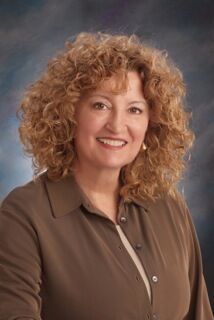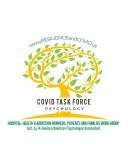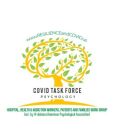Addiction
On the COVID-19 Battlefield
Providing psychological guidance, resilience, and hope.
Posted December 2, 2020
This is Part 3 of a three-part series about the origin, purpose, and goals of this blog, whose goal is to help people to cope and manage the many varieties of psychological trauma wrought by COVID-19.
Read part 1 Psychological Impact of COVID-19 on You, co-authored by Patricia A. O'Gorman, Ph.D.
Read part 2 When Pandemic Trauma Hits Home, by Maureen O'Reilly-Landry, Ph.D.
This article was written by Patricia A. O'Gorman, Ph.D.
It was International Women's Day, March 8, and I was in my hotel room in Santa Barbara, packing to return home after attending a friend’s wedding the day before. The news was on, warning of a new, highly contagious virus. I remember hearing that we shouldn’t touch our faces and thinking, “I have very long, curly hair. Not touching my face will be a challenge.” I idly considered trying to buy a hijab to wrap up my hair, keep it out of my face, and keep myself safe.
The next day I was on my first flight heading east, seated next to a group of juniors from a private school in Los Angeles who were traveling to New York City and Boston to interview at prestigious colleges and universities. I noticed they were wiping down their seats and tray tables with disinfectant. My anxiety rose. I asked them if I could have one wipe, and they graciously shared.
Three days later, on March 11 at 8:00 a.m., I entered one of the programs where I consult as a psychologist, a long-term residential addiction program for veterans with addiction and PTSD, where vets with any discharge status can stay for up to two years.
As soon as I entered the building, I knew something had changed. The air was charged. But it wasn’t until later in the day, when I was asked to speak to the director, who strongly suggested that I begin to work remotely, that I began to understand the gravity of the situation for those who work in the addiction field.
One way this became clear was the announcement that this rural nonprofit agency was now having all department heads—including maintenance, HR, and dietary, and so on—meet online every morning to plan for how to fight this new, unseen enemy. (The agency is St. Joseph’s Addiction Treatment and Recovery Centers, which spans five counties with 18 facilities that offer inpatient adult, veteran, and adolescent programs [where I also consult] as well as outpatient treatment, supportive housing, and a 24-hour Open Access Center.)
Yes, as if things weren’t challenging enough, the opioid epidemic has claimed over 72,000 lives in 2019, and that sad number has already been exceeded in 2020 without accounting for those also dying from the rapid increase in alcohol consumption. It was clear that we were all going to need to find ways to treat those suffering from the addiction epidemic, addicts, and their families while now dealing with a pandemic.

My Self-Care Component
I began to work remotely and also began feeling more and more depressed. Three years (almost to the day) after my last rescue dog died at the age of 17, I decided it was time, and I went to my local animal shelter and choose a five-year-old stray who had been badly abused. We began to save each other. But it wasn’t enough.
I began to write a blog post titled “Self-Parenting During COVID.” I had already written four books on self-parenting and resilience, I reasoned, so why not write about surviving the pandemic? My first post was about my dog, walking in nature, and realizing that we all need to pace ourselves because this was looking like a long fight.
Self-Parenting and COVID
I teach annually at the New England School of Addiction Studies. After learning my presentation would be virtual this year—a first for this organization—I prepared a presentation on Self-Parenting and COVID.
I had been scheduled to address the Child Welfare League of America at their national conference in March, which was canceled. They began a webinar series and invited me to present. (They are the publishers of my book on parenting and addiction, The Lowdown on Families Who Get High.) I said yes, presenting on this same topic, “Self-Parenting and COVID.”
Both presentations were very well received; my blog was getting more followers. But writing a blog series, deciding later to expand this into a book, and speaking on self-care during the pandemic as I did my clinical work virtually wasn’t enough. I was meeting the challenges of life during a pandemic, learning new ways to engage and treat those with addiction and trauma. One interesting challenge was how to continue an improv group I did with a professional director for our vets who had addiction and PTSD, and many who also had traumatic brain injury (TBI). Out of necessity, rather than cancel the improv, we moved it to Zoom, with incredible success.
But I wanted to do more.
My Journey Has Brought Me Here
It was then that I read an email from the Trauma Division of APA, of which I’m a member, announcing the establishment of a task force on COVID-19. I attended a virtual meeting and learned of a workgroup devoted to health care. I joined and began working with Maureen O’Reilly-Landry, Ph.D., and a group of psychologists spanning the globe. Maureen and I now co-chair this group.
What you will be reading are blog posts submitted by our group members and others, on topics that focus on how COVID-19 is impacting hospitals, addiction treatment centers, and other health-care facilities their staff, patients, and families.
We will be offering clear guidance because, in the words of one of the vets I treat, “Dealing with COVID is worse than combat.”
Needless to say, I was surprised when I heard this. “How?” I mumbled.
“Because in combat, you have clear directions, a clear chain of command, everyone is working together. This is not our country now, but this is what we need.”
We will try to rectify this lack of direction with clear guidance, referenced where possible, that will include blog posts and tip sheets.
As I complete this post tonight, I have just learned that the schools in the rural town in which I live have been closed until January. The county where the beloved adolescent facility where I consult is located has been declared a state of emergency.
We are all in this together.

Patricia A. O’Gorman, Ph.D., is the Consulting Psychologist for both the Merkel Veterans Residence and the Rose Hill Adolescent Residential Treatment Program of St. Joseph’s Addiction and Treatment and Recovery Centers in Saranac Lake, NY. She is the former Director of the Division of Prevention for the National Institute on Alcohol Abuse and Alcoholism (NIAAA), a co-founder of The National Association for Children of Addiction, and the author of 10 books on resilience, trauma, and addiction including Healing Trauma Through Self-Parenting, The Lowdown on Families Who Get High, The Resilient Woman and Self-Parenting in the Age of COVID-19 (in press). More information is available on her website.




